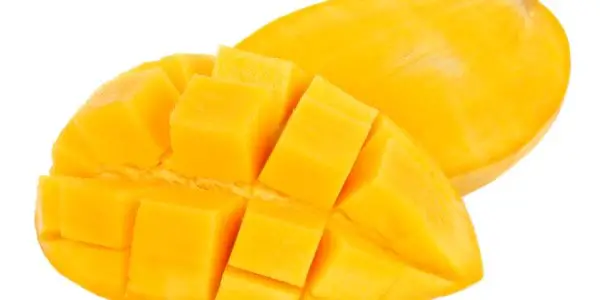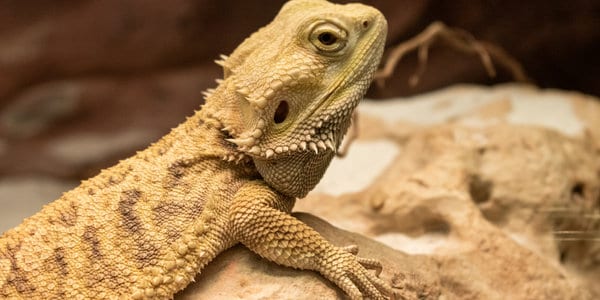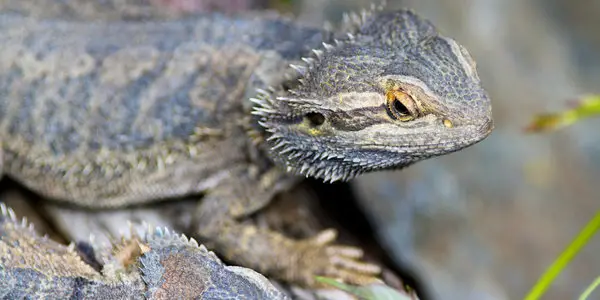It’s best to just give a few portions of mango to your bearded dragon once or twice a month. Use it as a salad topper to provide other vegetables for your pet.
It’s not good to feed the bearded dragon with food that doesn’t help. Don’t feed it mango daily since too much of it can be toxic for them.
Although mango contains essential nutrients, it’s also high in sugar. It’s also lacking minerals such as calcium which reptiles need.
It’s not recommended to be fed daily since it can cause metabolic bone disease for bearded dragons. Other health issues may also arise if it’s given all the time.
Why Mango is Good for Bearded Dragons?
1. Vitamin A
The amount of vitamin A in mango is not that high to be harmful to bearded dragons. Vitamin A toxicity can cause health issues for some animals.
Osteoporosis and congenital disabilities may occur. But it’s very unlikely to reach toxic levels when eating fruits. It’s still best to be careful when providing them to your pet since it still contains vitamin A.
2. Vitamin C
It’s a powerful antioxidant and helps to boost the immune system. This will help bearded dragons to fight illnesses. Mango has more than 36 mg of vitamin C per 100 grams. It’s a good amount for your pet to stay healthy.
If you want to see how it works, you can add it on wilted lettuce in a bowl of water. The lettuce will come back to life after soaking it with vitamin C powder.
3. Iron
Mango also contains a small amount of iron. It’s an important nutrient, especially for baby bearded dragons. It will help their growth and development. But iron can be toxic in high amounts.
The good news is, the iron present on mango is not toxic enough for your pet. It’s safe for the bearded dragons to consume.
4. Fiber
The fiber in mango is about 1.6 grams in every 100 grams. Fiber helps to regulate the digestive system. It can reduce diarrhea and constipation on bearded dragons.
Consuming foods that are high in fiber also reduces the risk of colon cancer. It allows the body to get rid of the toxins faster with fiber.
5. Water
Most reptiles such as the bearded dragons can get their water from fruits and veggies. Mango will keep the beardie hydrated while providing essential nutrients.
It can also be used to rehydrate a bearded dragon that is in distress. If it has gone for a long time without water, give it a mango to be hydrated again.

Can Mango Leaves, Peels, and Pit Be Eaten by Bearded Dragons?
When the mango peels are correctly chopped, bearded dragons can eat them. Mango peel contains carotenoids, polyphenol, as well as some vitamins, and fiber.
They are antioxidants that destroy free radicals from the tissue of bearded dragons. But it’s not recommended to feed your pet mango peel since they are hard and rough.
Mango skin is also exposed to pesticides. Washing the fruit may not be enough to remove them. It can be bad for your bearded dragon since it can choke or ingest the traces of pesticides.
While mango leaves may be nutritious as well, don’t feed them to your pet. It may cause tongue irritation or injure their mouth lining. The mango pit is not edible.

How to Prepare Mangoes For Bearded Dragons?
If you decide to feed mango for your bearded dragon, make sure to prepare it properly. Apple mangoes are a type of mango that has low water content. It’s a good choice for your bearded dragon.
Avoid giving them overripe fruits since it’s more acidic because the benzoic acid contestant is higher. It’s not good for bearded dragons to consume that.
When you harvest mangoes, let them sit for two days to drain water. This will improve the nutrient uptake of your pet. To remove the chemicals from the mango skin, wash it with warm or treated water.
Let it dry for 15 minutes before peeling it. Once peeled, cut the flesh smaller than the bearded dragon’s eye. Add a few portions in veggies or in-feeder insects and feed them to your beardie.
What Are the Concerns When Feeding Bearded Dragons Mangoes?
Overfeeding mangoes or other fruits to your bearded dragon is not recommended. It may raise some concerns about their health.
So before feeding too much mango to your beardie, make sure to consider that it can be bad for them. Mangoes may be nutritious but too much consumption is already bad.
1. Sugar Content
Mango contains high sugar levels and it can have a bad effect on your dragon. Make sure not to feed them too much of it or too often.
The bearded dragon can end up being obese if you overfed them ripe mangoes. Fruits should not be more than 10% of their diet.
Providing the bearded dragons’ foods high in sugar can result in digestive issues. Stomach aches and diarrhea can cause them to be dehydrated.
Even fruits should be added to the bearded dragon’s diet, it had to be the alright amount. Mango contains sugar which is bad when your bearded dragon eats a lot.
The excess sugar from fruits is also bad for the bearded dragon’s teeth. The plaque build-up can cause tooth decay for them as well.
The bearded dragon’s teeth are connected to their jaws. Infections and inflammation will cause some health problems for them. It can also result in multiple visits to the vet.
2. Calcium
Overfeeding your bearded dragon with mango can’t be good for them. It does not contain enough calcium they need. Calcium is a vital nutrient for bearded dragons.
Give them foods that are high in calcium to keep your dragon healthy. Providing food that is poor in vital nutrients can cause metabolic bone disease for these reptiles.
Fruits such as mango are safe to eat by bearded dragons. But it only contains little or no calcium. It will only make your pet’s stomach full but it’s not going to provide the nourishment they need.
You should ensure to profile food rich in calcium and other nutrients for your bearded dragon instead. They need more calcium than phosphorus in their diet.
When a bearded dragon gets more phosphorus than calcium, it will have a problem with absorption. That can cause serious health concerns for them.
Calcium is more important for these reptiles. Mango contains more phosphorus than calcium. Don’t feed mango to your beardie regularly since it doesn’t contain enough calcium.
Dietary calcium is very important for bearded dragons. Although you can also ask your vet for good calcium supplements for reptiles.
These two tiles need to have enough calcium every day. If you think your pet is not getting the calcium it needs, supplements will help. Avoid feeding it too many fruits as well and add calcium-rich foods in its diet.
READ MORE: How Often Should You GIVE Your Bearded Dragon CALCIUM?

FAQs
1. Can Bearded Dragons Eat Mango Every Day?
No, bearded dragons should not eat mango every day. As mentioned, mango is high in sugar but low in calcium. These reptiles need to have calcium-rich food. That will help them to stay healthy.
Mango can be fed once or twice a month. Just make sure to give more greens for your bearded dragon’s diet.
2. Can a Bearded Dragon Eat Frozen and Dried Mango?
Frozen mango will not harm your bearded dragon. But it’s still best to feed them fresh foods instead. Although frozen mango still retains its nutrients. Dried mangoes on the other hand should be avoided.
They are not fresh and are too sugary for your pet. If you want to feed mango to your bearded dragon, make sure it’s free.
3. Are Bearded Dragons Great Pets?
Yes, bearded dragons are great pets even for kids. They are docile and gentle reptiles. Even if you’re a beginner, you can learn how to handle and make a strong bond with them.
Caring for a bearded dragon is easy. Just feed them healthy meals regularly. Make sure to also provide some attention and maintain their enclosure.
